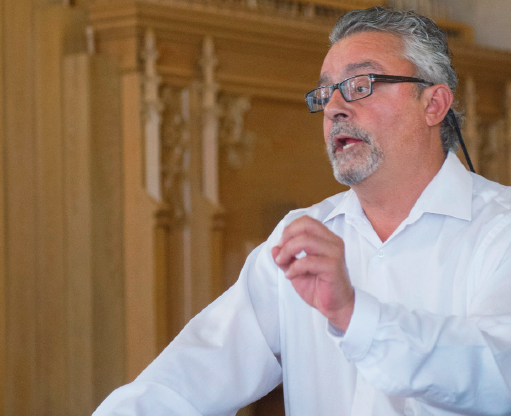 The FaithHealth model includes staff who focus on specific populations, such as homeless people, first responders or those who live in a certain area. Francis Rivers Meza is a certified educator who supervises chaplain students in the Clinical Pastoral Education (CPE) program. He also serves as FaithHealth liaison with the Hispanic/Latino community. Here, he discusses how an ID card program helped unify disparate groups in the community.
The FaithHealth model includes staff who focus on specific populations, such as homeless people, first responders or those who live in a certain area. Francis Rivers Meza is a certified educator who supervises chaplain students in the Clinical Pastoral Education (CPE) program. He also serves as FaithHealth liaison with the Hispanic/Latino community. Here, he discusses how an ID card program helped unify disparate groups in the community.
Born from dialog. The FaithAction ID card program started in Greensboro and emerged from a dialog between the faith community, primarily the Hispanic/Latino faith community, and the Greensboro Police Department. The police had realized they weren’t receiving reports of crimes or domestic violence because undocumented people were afraid to interact with law enforcement. So, after some difficult conversations in which trust needed to be built, the idea of an ID card emerged. Greensboro police worked with FaithAction to establish a process that allowed for stringent vetting of the applicants.
My involvement in the ID program began in 2014 through the asset mapping events we held in predominantly Hispanic/Latino neighborhoods in Winston-Salem. We learned of the tremendous need for an ID for undocumented people. We partnered with the Greensboro group to begin a program in Forsyth County that provides people with an ID that’s recognized by the sheriff ’s office and the police department. Both Novant Health Forsyth Medical Center and Wake Forest Baptist Health agreed to accept the ID as a way to identify patients — from the emergency departments to the clinics.
From this effort emerged a network — of local clergy, primarily, but also some nonprofits — that carried out the ID drives. Members of this network also respond to requests for help from Hispanic/Latino individuals.
Being better neighbors. One of the biggest challenges we’re facing is that undocumented immigrants now are seen as potential terrorists. We’re seeing a racialization of immigration. So people have been driven further and further into the shadows. There’s tremendous fear and suspicion. If you want to be a better neighbor to the Hispanic/Latino community, find some people willing to enter into what would probably be a difficult dialogue with you. If they are willing to extend to you the credibility and trust that they have in the community, then a broader conversation can begin. Just listen to the community, see what emerges and be willing to hang on for the ride.
Other things can emerge. In Greensboro, for example, the arts community used the ID card to invite people who have never been to a concert to come to one, and kids who have never been to a music or art class to take classes. So the ID card can help build interaction and trust with groups other than law enforcement.
A real contribution. I’m learning to overcome my own bias that the immigrant only has needs. On the contrary, immigrants have much to offer. Drive along Sprague and Waughtown streets in the South Side neighborhood of Winston-Salem. Largely abandoned 10 years ago, these streets are now being renewed thanks to small businesses and restaurants. The Hispanic/Latino community is making a real contribution, especially in areas of the city that would be falling by the wayside were it not for the energy and entrepreneurship of migrants.
Building trust. I’m most grateful for the friendships I’ve made with other clergy and community partners. I don’t know that the Hispanic/Latino churches are different than any other churches, but they tend to be pretty siloed: the Catholics don’t talk to the Protestants, who don’t talk to the Pentecostals, who don’t talk to the evangelicals. The ID card drive brought together this unique blend of people across faith backgrounds. We began to trust each other. We now go to one another’s churches and visit one another’s homes.
Adapted from a podcast with Francis Rivers Meza. Go to our podcast page HERE.
